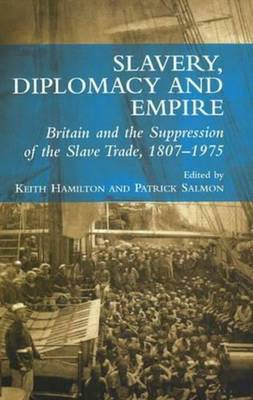
- Retrait gratuit dans votre magasin Club
- 7.000.000 titres dans notre catalogue
- Payer en toute sécurité
- Toujours un magasin près de chez vous
- Retrait gratuit dans votre magasin Club
- 7.000.0000 titres dans notre catalogue
- Payer en toute sécurité
- Toujours un magasin près de chez vous
Slavery, Diplomacy and Empire
Britain and the Supression of the Slave Trade, 1807-1975
Keith Hamilton
Livre broché | Anglais
41,95 €
+ 83 points
Format
Description
Throughout the nineteenth century British governments engaged in a global campaign against the slave trade. They sought through coercion and diplomacy to suppress the trade on the high seas and in Africa and Asia. But, despite the Royal Navy's success in eradicating the transatlantic commerce in captive Africans, the forced migration of labour and other forms of people trafficking persisted. This collection of essays by specialist international, naval and slave trade historians examines the role played by individuals and institutions in the diplomacy of suppression, particularly the personnel of the Slave Trade Department of the Foreign Office and of the Mixed Commission Courts; the changing socio-religious character and methods of anti-slavery activists and the lobbyists; and the problems faced by the navy and those who served with its so-called 'Preventive Squadron' in seeking to combat the trade. Other contributions explore the difficulties confronting British diplomats in their efforts to reconcile their moral objections to slavery and the slave trade with Britain's imperial and strategic interests in Ottoman Turkey, Persia and the Arabian Peninsula; British reactions to the continued exploitation of forced labour in Portugal's African colonies; and the apparent reluctance of the Colonial Office to attempt any systematic reform of the 'master and servant' legislation in force in Britain's Caribbean possessions. The final chapter brings the story through the twentieth century, showing how the interests of the Foreign Office sometimes diverged from those of the Colonial Office, and considering how the changing face of slavery has made it the world-wide issue that it is today.
Spécifications
Parties prenantes
- Auteur(s) :
- Editeur:
Contenu
- Nombre de pages :
- 256
- Langue:
- Anglais
Caractéristiques
- EAN:
- 9781845195731
- Date de parution :
- 04-03-13
- Format:
- Livre broché
- Format numérique:
- Trade paperback (VS)
- Dimensions :
- 150 mm x 226 mm
- Poids :
- 358 g

Les avis
Nous publions uniquement les avis qui respectent les conditions requises. Consultez nos conditions pour les avis.






